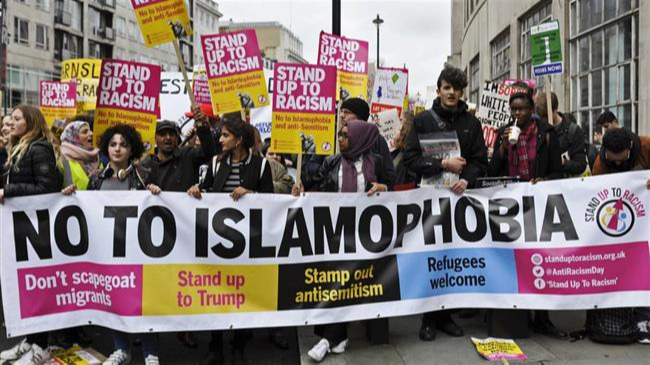
The file photo shows an anti-Islamophobia and anti-racism rally held in the British capital, London.
United Nations, March 19 (RHC)-- United Nations Secretary-General Antonio Guterres has warned that hatred and discrimination against Muslims has risen to "epidemic proportions," calling for further collective efforts to promote social cohesion and religious tolerance.
Guterres raised the alarm on Wednesday at a UN event marking the International Day to Combat Islamophobia, and described surging anti-Muslim bigotry as part of a wider global shift toward nationalism and away from minority rights.
"Minority communities are part of the richness of our cultural and social fabric, yet we see not only forms of discrimination, but also policies of assimilation that seek to wipe out the cultural and religious identity of minority communities," he said.
Guterres said some examples of anti-Muslim bigotry included disproportionate restrictions against Muslims manifesting their beliefs, limits on accessing citizenship, and widespread stigmatization of Muslim communities.
The UN chief said Muslim women faced "triple levels of discrimination" because of their gender, ethnicity, and faith. Guterres added that "discrimination diminishes us all,” and called for safeguarding the rights of minority communities.
"We must continue to push for policies that fully respect human rights and religious, cultural and unique human identity," he added. "As the Holy Quran reminds us: nations and tribes were created to know one another. Diversity is a richness, not a threat."
The International Day to Combat Islamophobia, organized by the Organization of Islamic Cooperation (OIC), came after the March 15, 2019 attack on two mosques in Christchurch, New Zealand, where 51 Muslim worshipers were killed and 49 others were injured.
Anti-Muslim sentiments have been on the rise across Europe in recent years in the wake of terrorist attacks in the continent. The attacks were carried out by the Daesh sympathizers or the terror group's members who had returned home following their defeat in Iraq and Syria. Muslim leaders in Europe and around the world have condemned the terrorist attacks.
Moreover, the rise of far-right ideology and the propagation of anti-immigration policies have exacerbated the status of religious minorities in Europe.

